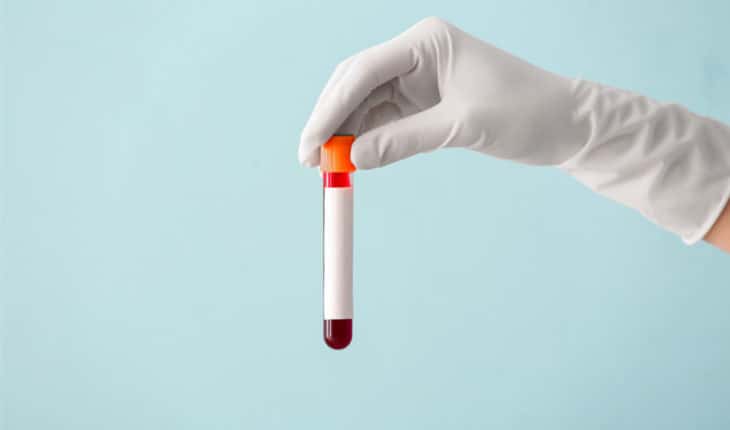Patients at high risk of cardiovascular disease may be slipping through the net because there’s a better test that GPs can use to detect it, according to new research.
Heart disease is one of the biggest killers in the UK, with heart and circulatory conditions claiming the lives of 160,000 people each year, according to the British Heart Foundation.
One of the key diagnostic tests doctors use to assess someone’s cardiovascular disease (CVD) is a blood cholesterol test.
If it shows elevated levels of low-density lipoprotein, aka ‘LDL-C’ or ‘bad cholesterol’ a patient can sometimes be prescribed drugs which work to lower LDL-C levels in the blood.
But there is growing evidence to suggest that this LDL-C blood test perhaps isn’t the best way forward – and it could actually be missing many individuals at the highest risk of CVD.
Experts say there’s a more accurate test that involves measuring something called ‘apolipoprotein B’, or ‘ApoB’, levels in the blood.
And now academics – including Dr Richard Webb, Lecturer in Clinical Nutrition at Liverpool Hope University – are sounding the alarm.
Dr Webb says that the new findings are ‘concerning’ and adds: “Someone may go to the GP and have their LDL-C checked and it may come back normal and not raise any red flags. However, our findings show they could very well be consuming a poor diet and also be predisposed to chronic disease.”
Dr Webb explains that lipoproteins are unique particles that carry cholesterol and fats around your bloodstream. He describes these lipoproteins as being like ‘miniature boats’ that ship cholesterol around the ‘waterways’ that are our blood vessels.
When doctors use an LDL-C test it measures the amount of cholesterol stored on board the ‘boat’ – or lipoprotein particle.
But what you also have on the outside of this particle is an ApoB molecule.
Dr Webb adds: “The important thing to note is that on one particle of LDL, you have one molecule of ApoB. By measuring ApoB it allows us to determine the number of LDL particles, not just the amount of cholesterol stored inside a particle.
“For the majority of people, the two measures – LDL-C and ApoB – are likely to be well aligned.
“But what we now know – and which is very worrying – is that in 20 per cent of people you can have ‘discordance’, where an LDL-C level might be low and ApoB levels high, or you could have it the other way around.
“And this is what really concerns us. You might go to the doctor, they analyse your blood, and you have nice, low LDL-C levels. You breathe a sigh of relief and continue with your day-to-day lifestyle choices.
“However, the GP probably hasn’t measured your ApoB. If you are found to have discordantly high levels this places you statistically at the very highest risk of having a heart attack, even though your LDL-C levels may be normal or low.
“Similarly, it can also work the other way around, and you might then be recommended lipid-lowering medication when perhaps you may not necessarily need them.
“What we’re saying is that ApoB is the driving force here – it’s a better predictor of heart disease – but it’s not routinely measured in doctors’ surgeries.”
The evidence is mounting.
In recent months Dr Webb and colleagues have produced a series of papers exploring the topic.
Dr Webb is lead author on a piece published in the journal Nutrition, Metabolism & Cardiovascular Diseases which digs-down into the discordance between LDL-C and ApoB levels and the link with diet.
He says: “We asked, ‘Is there an association between someone’s diet and having low levels of LDL-C but high levels of ApoB, or vice versa?'”
Sophisticated ‘machine learning’ computer algorithms were used to analyse almost 15,000 patients from America’s long-running National Health and Nutrition Examination Survey’.
Of the 14,265 patients, 285 were found to have low LDL-C levels but high ApoB levels, putting them at high risk of CVD.
Dr Webb adds: “That’s around 2% of patients, a relatively low number, but it’s still potentially many thousands of people who go to see their GP and who are not warned about their risk of having a heart attack.”
The stats showed how those with the worst diets – filled with saturated fats and carbohydrates – also had the lowest LDL-C scores yet the worst ApoB levels.
Furthermore, by using additional advanced epidemiological techniques, Dr Webb and colleagues also demonstrated that genetically higher body fat percentage is causally related to increased levels of ApoB, providing further evidence of how obesity can contribute towards an increased risk of cardiovascular disease
Another piece of research published in December in the British Journal of Nutrition, co-authored by Dr Webb, looked at patterns of nutrients associated with LDL-C and ApoB levels.
When it comes to eating well, a so-called ‘Mediterranean-style diet’ rich in olive oil, fruit and nuts was associated with lower ApoB scores. Conversely, the diets associated with discordantly high ApoB levels were – predictably – rich in saturated fats and refined carbohydrates.
Meanwhile a third study published in the Journal of Clinical Medicine examined how LDL-C and ApoB levels related to kidney disease.
Dr Webb states: “Heart disease and kidney disease also go hand in hand so we wanted to see if the discordance between the LDL-C and ApoB related in any way to kidney disease.
“After running the analysis we again found that there was an association between high levels of ApoB, low levels of LDL-C, and kidney disease.
“The overall take home message here is that we need to be measuring both LDL-C and ApoB. Without both measurements we simply can’t accurately measure the risk.
“There are occasional caveats to this, particularly when it comes to much rarer diseases, but from our research, ApoB is a really informative test.
“And there needs to be better awareness of this among the medical community and wider society. People are slowly becoming more knowledgeable but much more work needs to be done.”
- New lipid-based pathway discovered as key to memory formation - 25th June 2025
- Crucial link could explain how Alzheimer’s takes hold - 25th June 2025
- Understanding Your Mind Can Improve Daily Life - 25th June 2025






